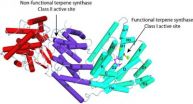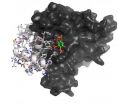(Press-News.org) CORVALLIS, Ore. – New research at Oregon State University provides evidence for the first time that disruption of circadian rhythms – the biological "clocks" found in many animals – can clearly cause accelerated neurodegeneration, loss of motor function and premature death.
The study was published in Neurobiology of Disease and done by researchers at OSU and Oregon Health and Science University. Prior to this, it wasn't clear which came first - whether the disruption of biological clock mechanisms was the cause or the result of neurodegeneration.
"In these experiments, we showed through both environmental and genetic approaches that disrupting the biological clock accelerated these health problems," said Kuntol Rakshit, an OSU graduate fellow.
"There's a great deal of interest right now in studies on circadian rhythms, as we learn more about the range of problems that can result when they are disrupted," Rakshit said. "Ultimately we hope that this research will be taken from the laboratory to the bedside."
These studies were done with fruit flies, but the OSU scientists said previous research has indicated there are close parallels between them and humans. Some of the genes regulating circadian rhythms in flies are so important that they have been preserved through millions of years of separate evolution and still do the same thing in humans.
The biological clock, in humans and many other animals, is a complex genetic mechanism tuned to the 24-hour day and regular cycles of light, dark and sleep. It influences a wide range of biological processes, from fertility to hormone production, feeding patterns, DNA repair, sleep, stress reactions, even the effectiveness of medications. In humans, researchers have found strong correlations between disrupted clock mechanisms, aging, and neurologic diseases such as Alzheimer's and Huntington's disease.
The fruit flies used in this research carried two mutations, one that disrupts circadian rhythms and another that causes flies to develop brain pathologies during aging. These double mutants had a 32-50 percent shorter lifespan, lost much of their motor function, and developed significant "vacuoles" or holes in their brains far sooner than flies with a functional clock.
The decline and loss of clock function may be just the beginning of a damaging, circular process, said Jadwiga Giebultowicz, an OSU professor of zoology, member of the OSU Center for Healthy Aging Research and project leader.
"When the biological clock begins to fail, rhythms that regulate cell function and health get disrupted, and we now know that this predisposes the brain to neurodegeneration," Giebultowicz said. "But that neurodegeneration, in turn, may cause more damage to the clock function.
"A healthy biological clock helps protect against this damage," she said. "When the clock fails, the damage processes speed up."
Aging is closely associated with this process, Giebultowicz said, but it's not clear exactly how. Molecular clock oscillations decline during aging. Finding ways to restore them might form a possible therapy for biological clock damage and help to prevent disease, and work in that area will be part of future research.
###
This research was supported by the National Institutes of Health and the Integrative Graduate Education and Research Traineeship Program, or IGERT in Aging Sciences at OSU, a program of the National Science Foundation. Collaborators included Doris Kretzschmar, a professor at Oregon Health and Science University, who specializes in the use of flies as models for human neurodegenerative disease.
Editor's Note: Digital images are available online to illustrate this story.
Holes in the brain of a fruit fly: http://bit.ly/zk0jzE
Fruit fly: http://bit.ly/yiR93B
The study this story is based on is available at ScholarsArchive@OSU: http://bit.ly/AdBMx6
END
The recent discovery that bisabolane, a member of the terpene class of chemical compounds used in fragrances and flavorings, holds high promise as a biosynthetic alternative to D2 diesel fuel has generated keen interest in the green energy community and the trucking industry. Now a second team of researchers with the U.S Department of Energy (DOE)'s Joint BioEnergy Institute (JBEI) has determined the three-dimensional crystal structure of a protein that is key to boosting the microbial-based production of bisabolane as an advanced biofuel.
The JBEI research team, led ...
An Emory University study published in the January issue of Health Affairs assesses real-world lifestyle interventions to help delay or prevent the costly chronic disease that affects nearly 26 million Americans.
Researchers from Emory's Rollins School of Public Health (RSPH) systematically reviewed the published literature and analyzed 28 studies that tested adaptations of the Diabetes Prevention Program (DPP) trial in real-world settings. Published in 2002, this major clinical trial showed that structured lifestyle programs for people with prediabetes could halve the ...
CHICAGO (January 10, 2012) – According to the results of a new study published in the January 2012 issue of the Journal of the American College of Surgeons, many early-stage breast cancer survivors lacked knowledge about their disease and were not meaningfully involved in treatment discussions or asked their preferences regarding the approach to treatment. As a result, the study's investigators determined that there is a need for improvements in the quality of the surgical decision-making process for these patients.
The retrospective study sought to evaluate the quality ...
Scientists at the University of Leicester have opened up a whole new approach to the therapeutic intervention for a family of anti-cancer drug targets, thanks to a completely new and unexpected finding.
Professor Schwabe and his colleagues, Drs Watson, Fairall and Santos, have published their research this week in leading science magazine Nature detailing a new understanding of how transcriptional repression complexes work. Their work, which is based around determining atomic resolution structures of medically important bio-molecular complexes, has been ongoing for six ...
Climate change in the form of reduced snowfall in mountains is causing powerful and cascading shifts in mountainous plant and bird communities through the increased ability of elk to stay at high elevations over winter and consume plants, according to a groundbreaking study in Nature Climate Change.
The U.S. Geological Survey and University of Montana study not only showed that the abundance of deciduous trees and their associated songbirds in mountainous Arizona have declined over the last 22 years as snowpack has declined, but it also experimentally demonstrated that ...
An extremely hot, massive young galaxy cluster — the largest ever seen in the distant Universe — has been studied by an international team using ESO's Very Large Telescope (VLT) in the Atacama Desert in Chile along with NASA's Chandra X-ray Observatory and the Atacama Cosmology Telescope. The new results are being announced on 10 January 2012 at the 219th meeting of the American Astronomical Society in Austin, Texas.
The newly discovered galaxy cluster [1] has been nicknamed El Gordo — the "big" or "fat one" in Spanish. It consists of two separate galaxy subclusters colliding ...
Over the holidays Long Island Exchange Columnist Cognac Wellerlane attended a holiday celebration at the House of Savoia. The event was hosted by suit and costume designer Michelle Savoia and Vanity Fair editor George Wayne. It was held on Essex Street in the lower east side of Manhattan.
The House of Savoia is known for its custom suits and men's apparel and Savoia is famous for designing costumes for Broadway shows. The event was sponsored by Van Gogh Vodka, and cocktail courtesy by Molinari. Among those who attended were a variety of celebrities, such as models, actors, ...
HCMWorks announced today the naming of Ted Weyn to the Sourcing Interests Group's Advisory Board.
Sourcing Interests Group (SIG), www.sig.org, is a membership organization comprised of sourcing and outsourcing professionals from Fortune 500 and Global 1000 companies, as well as the service providers and advisory firms that serve them. Members of all types are focused on advancing the sourcing/procurement and outsourcing industries by sharing best practices and thought leadership in a strictly-enforced non-commercial environment.
SIG is acknowledged globally for its ...
New findings by St. Michael's researchers about the way cells work could lead to a test and therapy for kidney failure caused by E. coli
TORONTO, Ont., Jan. 10, 2012—Ever since the water supply in Walkerton, Ont., was contaminated by E. coli in 2000, Dr. Philip Marsden has been trying to figure out just how a toxin released by that particular strain of the bacteria causes kidney damage in children.
Now Dr. Marsden and his team based at St. Michael's Hospital and the University of Toronto, led by graduate student Tania Petruzziello-Pellegrini, together with an international ...
Using the NASA/ESA Hubble Space Telescope, astronomers have uncovered a cluster of galaxies in the initial stages of development, making it the most distant such grouping ever observed in the early Universe.
In a sky survey made in near-infrared light Hubble has spotted five galaxies clustered together. They are so distant that their light has taken 13.1 billion years to reach us. These galaxies are among the brightest galaxies at that early stage of the Universe's history. They are also very young: we are seeing them just 600 million years after the Universe's birth ...




